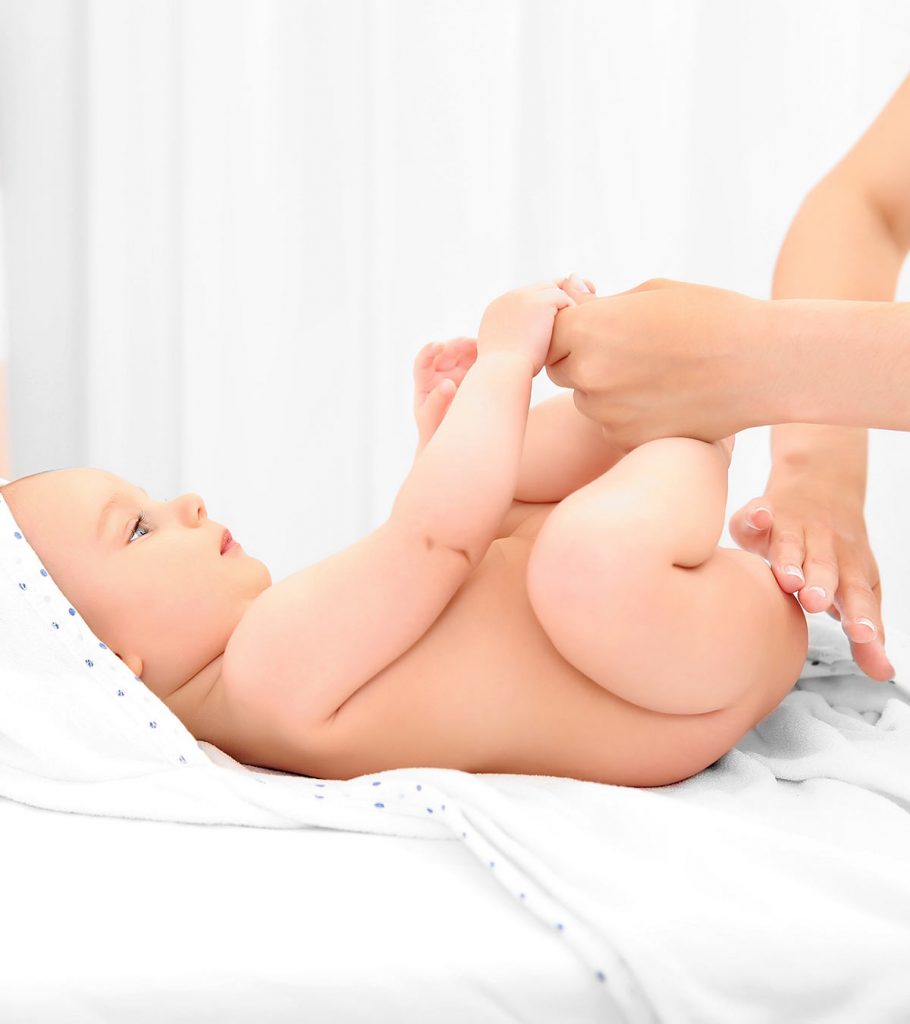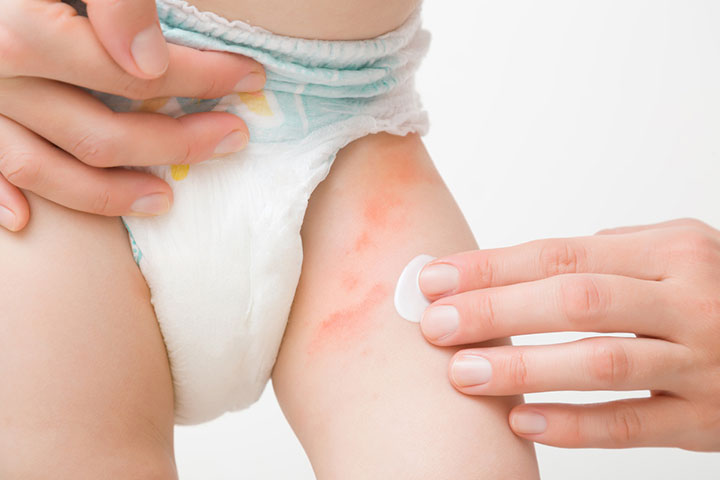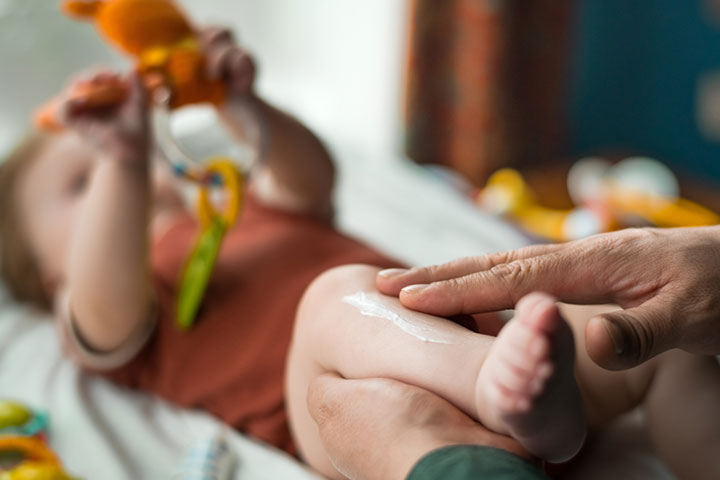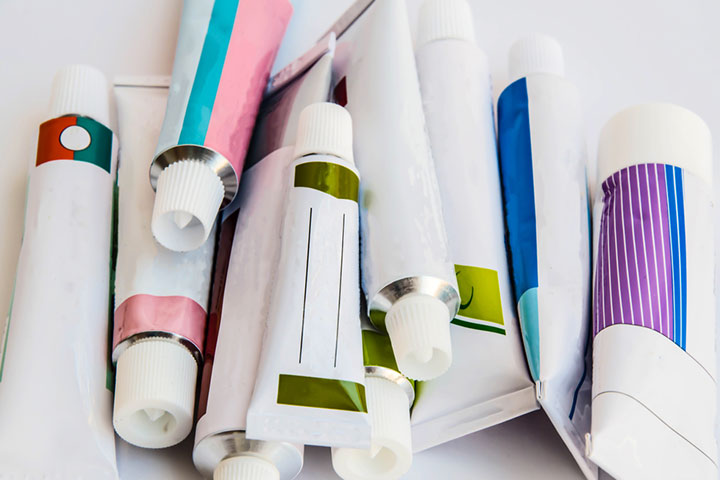Hydrocortisone is a topical corticosteroid medication available in the form of lotions, ointments, and creams (1). Hydrocortisone cream for babies is an over-the-counter drug and is usually prescribed to relieve skin-related symptoms such as redness, itchiness, and swelling. However, you should use this cream only when advised by your baby’s pediatrician, as undirected use of this medication could cause side effects in babies.
Explore more about the directions of use, recommended dosage, side effects, precautions, and other concerns regarding hydrocortisone creams for babies.
Is Hydrocortisone Cream Safe For Babies?
Mild doses of hydrocortisone creams used as per the doctor’s direction are unlikely to cause any side effects. The use of hydrocortisone without a doctor’s supervision may lead to undesired effects.
Possible side effects of hydrocortisone cream due to inappropriate use may include (2):
- Redness of the skin
- Possible spread of untreated infection from the affected area of skin to unaffected areas
- The skin may become thin after long-term use
- The skin may become lighter during the topical treatment
- The skin may become dry and flaky
In some rare cases, corticosteroid cream can get absorbed into the bloodstream, primarily through damaged skin (wounds) and may cause side effects. Adrenal glandiXTwo glands situated above the kidneys that produce hormones, including cortisol, adrenaline, and aldosterone. suppression and high blood sugar are the side effects of steroids, and these may cause the following signs and symptoms (2).
- Stomach upset
- Vomiting
- Fainting
- Muscle weakness
- Weight loss
- Sleepiness or drowsiness
- Rapid breathing
- Fruity odor of the breath
- Loss of appetite or increased hunger
Babies and young children may have slow growth due to the absorption of hydrocortisone into the bloodstream. In rare cases, anaphylaxis (allergic reactions) may occur, which needs to be treated in an emergency.
Note: Hydrocortisone cream may not have side effects in all babies, and not all side effects may be seen in a baby.
Why Is Hydrocortisone Cream Used For Babies?
Application of hydrocortisone cream or ointment reduces swelling, erythema (redness), and pruritus (itching) caused by skin inflammation from various diseases and conditions.
Pediatricians may prescribe hydrocortisone creams for the following conditions weighing the benefits over risks (3).
- Eczema
- Contact dermatitis
- PsoriasisiXA skin condition characterized by thick, scaly patches, dryness, and itchiness.
- Insect bites or stings
- Diaper rash in extreme cases
- Heat rash in extreme cases
You may apply the cream as directed by the doctor for positive outcomes.
How Do You Use Hydrocortisone Cream On Babies?
You may follow the following tips for the right application of hydrocortisone cream on your baby’s skin (3).
- Wash or sanitize your hands before and after applying the cream.
- Squeeze out the required amount of cream on your finger.
- Gently apply a thin layer of the cream to the affected area.
- Gently and slowly rub the cream until it disappears and absorbs into the skin.
Observing the following precautions may help avoid side effects and other adverse effects.
- Do not use the cream on unaffected skin.
- Do not use more or less than the quantity prescribed by the doctor.
- Do not cover the affected area with a bandage after application unless directed by the doctor. If applying to the diaper area, do not cover it with a tight-fitting diaper. You may dress the baby in loose clothing.
- Do not apply the cream around the mouth or eyes unless directed by the doctor.
It is best to apply the cream at the same time each day, and not use it along with other medicated creams or skin products, like moisturizers. Maintain a gap of eight to 12 hours between applications if the baby has a dosage of twice a day. If you notice no improvement in a week or if the condition worsens, speak to the doctor.
How Much Cream Should You Apply To Babies?
The amount of hydrocortisone cream needed may vary as per the type of skin condition, the severity of the condition, the affected area of the body, and your baby’s age. You may follow the pediatricians or pediatric dermatologists’ prescription for the dose and duration of the topical treatment.
Pediatricians may prescribe the amount of cream in the fingertip unit, that is, the amount of cream that can be squeezed on your fingertip. Usually, one fingertip unit is recommended for a skin area double the size of the flat or palm of your hand.
Alternatives To Hydrocortisone Cream For Babies
If your baby has side effects to even low to moderate potency topical hydrocortisone, pediatricians may suggest alternatives to treat the skin condition. These may include:
- Anti-allergic medications
- Skin moisturizing creams, ointments, or lotions
- Regular baths using baby shampoos, however avoid prolonged periods in water
- Application of breast milk can be considered for diaper rash
- Regular baths using baby shampoos
Keeping your baby’s skin clean and dry is the best way to prevent many skin conditions, such as diaper rash and contact dermatitisiXA skin condition characterized itchiness and inflammation, triggered by a particular substance or allergen.. If your baby has sensitive skin, try to use hypoallergeniciXCharacteristic of a substance to cause fewer allergic reactions.baby products and always seek advice from the pediatrician when you notice skin rash in babies. Never delay the care until more skin area is affected.
Facts About Steroid Creams
The following facts may help you to know more about the topical hydrocortisone medications (2).
- Hydrocortisone belongs to the class of medicines called corticosteroidsiXSteroid hormones produced in the adrenal cortex that help alleviate inflammation and the immune system activity., which is different from anabolic steroids used for muscle enhancement.
- Most hydrocortisone creams are mild.
- Hydrocortisone butyrate (Locoid) is a potent medication that is only available on prescription.
- Hydrocortisone creams are available in different dosage forms such as 0.1%, 0.5%, 1%, 2.5%, etc. 0.1% hydrocortisone cream contains 1mg hydrocortisone in each gram of cream, while 2.5 % hydrocortisone cream contains 2.5mg of hydrocortisone in each gram.
- Hydrocortisone creams plus antimicrobials (antifungal or antibacterial) are often available for treating skin inflammation due to skin infections.
- Ointments are preferred for dry and flaky skin conditions, and lotions help cover large areas of skin and scalp. The cream form is best recommended for moist skin areas.
- Dermacort, Zenoxone, Lanacort, Mildison Lipocream 1%, and Dioderm are a few examples of hydrocortisone cream brands.
Pediatricians may prescribe hydrocortisone cream for your baby to reduce signs of skin inflammation such as redness and swelling due to skin infections or other diseases. The amount of cream may vary depending on the skin conditions. It is recommended to use OTC hydrocortisone cream as per the doctor’s advice since it can be associated with side effects. You should wash your hands before applying the cream layer to the affected area. Also, ensure not to apply the cream on unaffected areas of skin.
Key Pointers
- Hydrocortisone creams are prescribed to treat the skin’s swelling, itching, or redness.
- But it should be used only under the supervision of a medical practitioner to avoid unwanted repercussions.
- Instead of hydrocortisone creams, you might also use skin lotions or creams.
Wondering if hydrocortisone cream is safe on the dry skin of your 8-week-old baby? Explore this video to find out about the advantages and risks associated with it.














